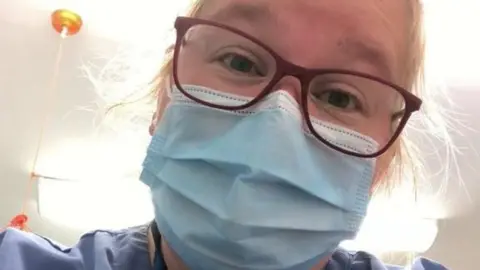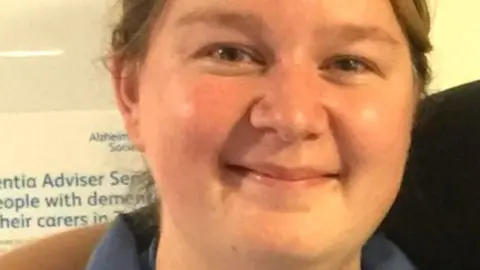Thousands of NHS staff with long Covid risk losing their pay
 BBC
BBCThousands of NHS staff across the UK are facing pay cuts because of a change in Covid sickness policy.
Analysis by BBC Panorama suggests that between 5,000 and 10,000 NHS workers could be off sick with long Covid.
Unions are accusing the government of failing to support health staff who worked during the coronavirus pandemic.
The government says the Covid-19 public inquiry will examine these issues when it begins taking evidence in May.
Changes to special sick pay rules introduced during the pandemic mean that some NHS staff unable to work due to long Covid may soon no longer receive full pay.
Enhanced provision ended last year. Many had a six-month transition, so expect their wages to go down soon.
Rachel Hext is hoping she will get better after developing long Covid and being unable to work for more than two years.
But really, she's not sure that she will ever be the same again.
The 35-year-old is a nurse at a small community hospital in Brixham, Devon.
'Really worried about money'
In October 2020, Rachel was caring for Covid patients. A few days later, she tested positive.
Her symptoms include chest pain, brain fog, fatigue, joint pain, allergies, heart problems, sinus issues and hearing loss.

Rachel is still on full pay but a change in sickness rules means her salary is due to be cut in half at the end of February.
She says she will be £1,000 a month worse off.
She has applied for an NHS Injury Allowance, which could top up her pay, but doesn't know if she will get it.
The Torbay and South Devon NHS Foundation Trust says it can't comment because there is a legal claim, which it is defending.
The trust's chief executive, Liz Davenport, adds: "The health and wellbeing of our staff is our priority, and we are extremely grateful to all our colleagues in the NHS and care services who worked tirelessly during the pandemic to care for our patients."
Rachel says she's really worried about money.
She adds: "I do appreciate the NHS can't pay us forever, but there's hope we can actually bring something back to the NHS again."

Catherine Burns meets NHS workers who are living with long Covid and struggling to return to work. They now face the prospect of having to retire early or even being sacked.
Watch now on BBC iPlayer (UK only)

Special sick pay
At the start of the pandemic, the government brought in special Covid sick pay for staff directly employed by NHS Trusts.
This meant that, if they got Covid, they would get full pay, however long they were off work.
This didn't include everyone. For example, GPs were not covered.
It was a temporary measure and the scheme ended last summer.
There is some local discretion and the rules may vary depending on length of service and where you work in the UK.
But essentially, standard sick pay rules have come back for NHS staff.
This means that some people have already seen their pay go down, with more to follow soon.
The NHS in England and Wales do not publish overall numbers for showing how many staff are off sick with long Covid.
Northern Ireland's Department of Health told us its most recent figures show 0.6% of its health and care staff are off because of long Covid.
In Scotland it's 0.3%.
If these rates are reflected across the UK, it could mean that between 5,000 and 10,000 staff absent because of long Covid.
'No man's land'
Panorama has spoken to other health workers who say they are in the same position as Rachel.
Some face losing their jobs.
Professor David Strain is the chair of the Board of Science at the British Medical Association (BMA) and says this makes him "genuinely angry".
He explains: "We've got a group of people that have put themselves forward to look after the population, they've been left with an illness and they're not being supported.
"They're just in a no man's land."
He believes that health workers with long Covid should be allowed to focus on their recovery without money worries.
Compensation
Layla Moran chairs a cross-party group of politicians looking at how the pandemic was handled in the UK.
She says other countries have already designated Covid as an occupational disease, entitling those affected to financial support.
She adds: "We are falling behind our peers in our recognition of this as a real disease that needs proper recognition and compensation."
NHS guidelines encourage managers to support staff to return to work, with options like phased returns.
A government spokesperson says: "The Covid-19 inquiry has been set up to examine the government's response to the pandemic and we will respond openly and transparently to the inquiry.
"In total, we have invested £314 million to establish specialist services throughout England to direct people experiencing long Covid into the right treatment and rehabilitation services, including occupational health services."
But the government accepts that long Covid is having an impact on the NHS, contributing to workforce inactivity.
The inquiry will start hearing evidence in May. It has a huge scope and could last for years.
